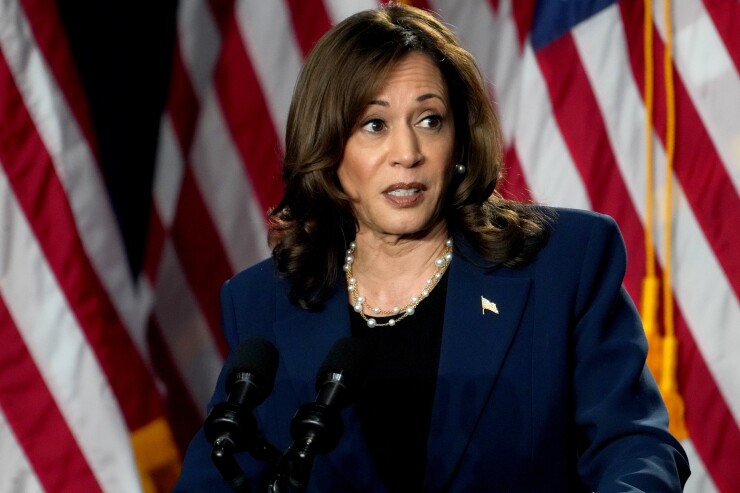Following President Biden's
The vice president has a
Throughout her two-decade career in politics, Harris' name has been attached to efforts intended to increase the supply of affordable housing, address the racial wealth gap, and combat mortgage fraud. These initiatives, and how she has interacted with mortgage entities in the past as attorney general, can offer insight into her potential agenda if elected to higher office.
The platform for her 2020 presidential campaign included the pursuit of racial equality, with a
In May, Harris announced $5.5 billion in new funding to boost affordable housing supply and expand rental assistance through HUD.
The White House also recently drew some criticism from the mortgage industry after the
Prior to her stint at the White House, Harris' time in California was marked by long-term problems with housing
In 2019, then a senator, Harris introduced a
Waters said the legislation will ensure affordable housing is part of broader infrastructure investments. The House bill was referred to the Subcommittee on the Constitution, Civil Rights, and Civil Liberties in Nov. 2022 and no action has been taken since.
"Too many Americans are fighting tooth and nail to keep a roof over their heads as our nation continues to face a housing affordability and homelessness crisis," Harris said in a 2019 joint press release. "It will take a comprehensive and serious investment to confront this issue head on, and the Housing is Infrastructure Act is our best chance to get it done."
While Harris was not very active on banking policy issues as a senator, she did oppose the 2018 regulatory relief law that allows mid-sized banks to forgo certain ability-to-pay requirements in residential mortgage loans. The bill passed in the Senate despite her vote and was signed into law by former President Trump.
During her term as attorney general, from 2011 to 2017, she supervised California's litigation over bank mortgage policies and held out in multistate settlement negotiations to force banks to raise their offers for homeowner relief.
"Kamala comes from the school of thought that government must save Wall Street from itself," Eleni Kounalakis, the Democratic lieutenant governor of California and an early backer of Harris's presidential campaign, told National Mortgage News in 2020. "I know she values competition and entrepreneurship, and I know she will also hold big corporations accountable."
In one case, Harris negotiated for California to receive a larger portion of the $25 billion National Mortgage Settlement with five servicers over their use of "robo-signing" on foreclosure documents. After talks with Bank of America Corp., Citigroup Inc. and other lenders, initial offers of less than $5 billion grew to $20 billion in relief for homeowners in addition to $410 million that went to the state on behalf of big pension funds for misrepresentation in the sale of mortgage-backed securities.
Some argued that California should not have received that much benefit from the National Mortgage Settlement, as it left many homeowners with
She also created a task force in California aimed at cracking down on industry scams, called the
Harris faced much criticism, however, for deciding not to pursue a civil enforcement action
OneWest was run by Steven Mnuchin, who at the time was the CEO and founder of Dune Capital, before he sold the bank to CIT Group in 2015. Mnuchin later served as Secretary of Treasury during the Trump administration. Harris was then the only Democratic senate candidate in 2016 to receive a contribution from Mnuchin, a Keefe, Bruyette & Woods report on her candidacy noted. Regarding not pursuing OneWest, Harris reportedly told The Hill, "It was a decision my office made."
After stepping aside, Biden firmly endorsed Harris. She's also received endorsements from over half of the pledged delegates she needs to secure the nomination, according to The Associated Press. The vice president said she seeks to "earn and win" the Democratic nomination.
If the party selects her, Harris will still need to choose a running mate and boost a campaign for her candidacy with less than 100 days left in the race. The vice president received $81 million in donations in the first 24 hours since her announcement to run, setting a historic record, according to the Associated Press.
Before announcing her run, Harris had agreed to a debate with the GOP vice presidential nominee






